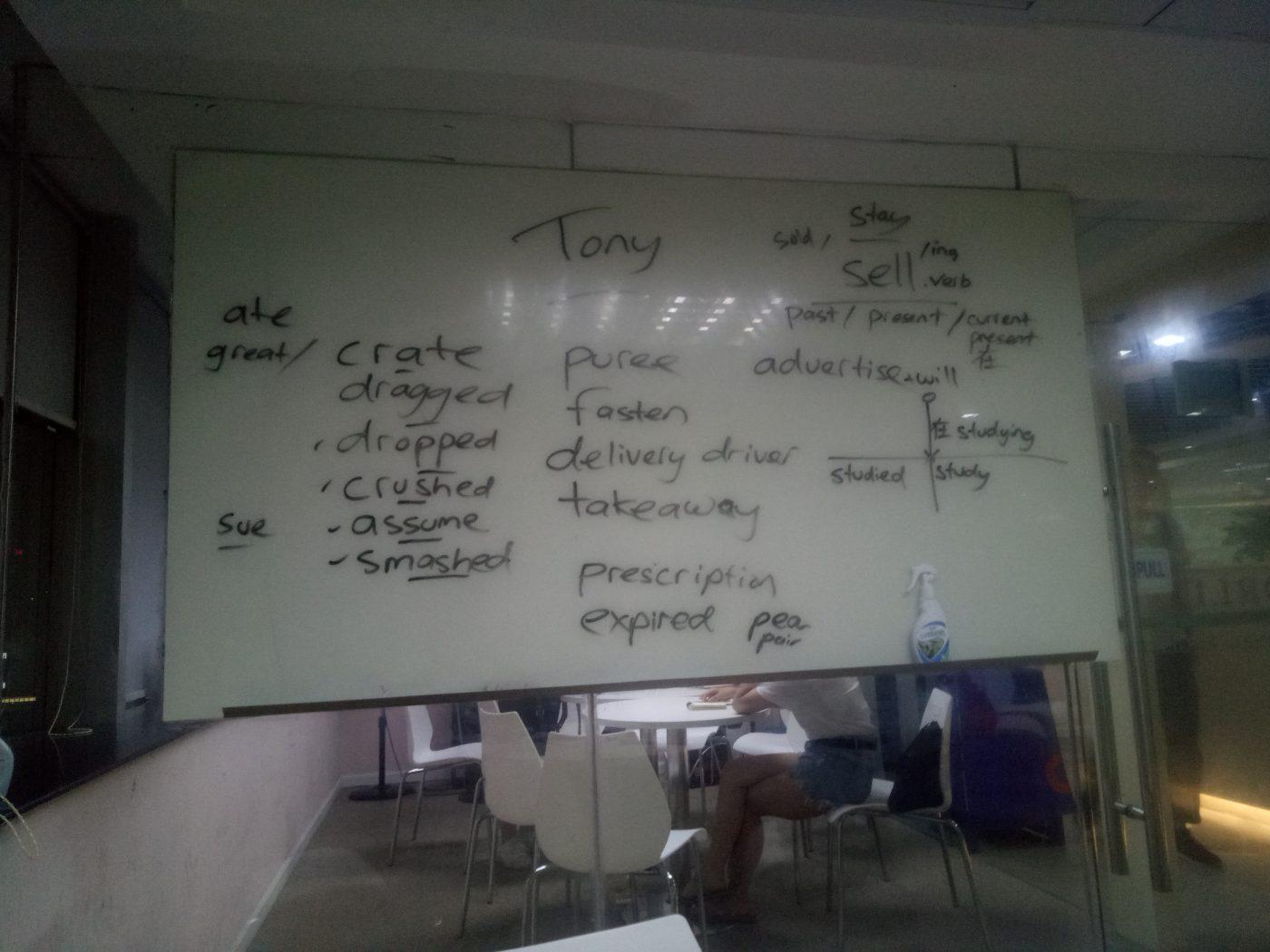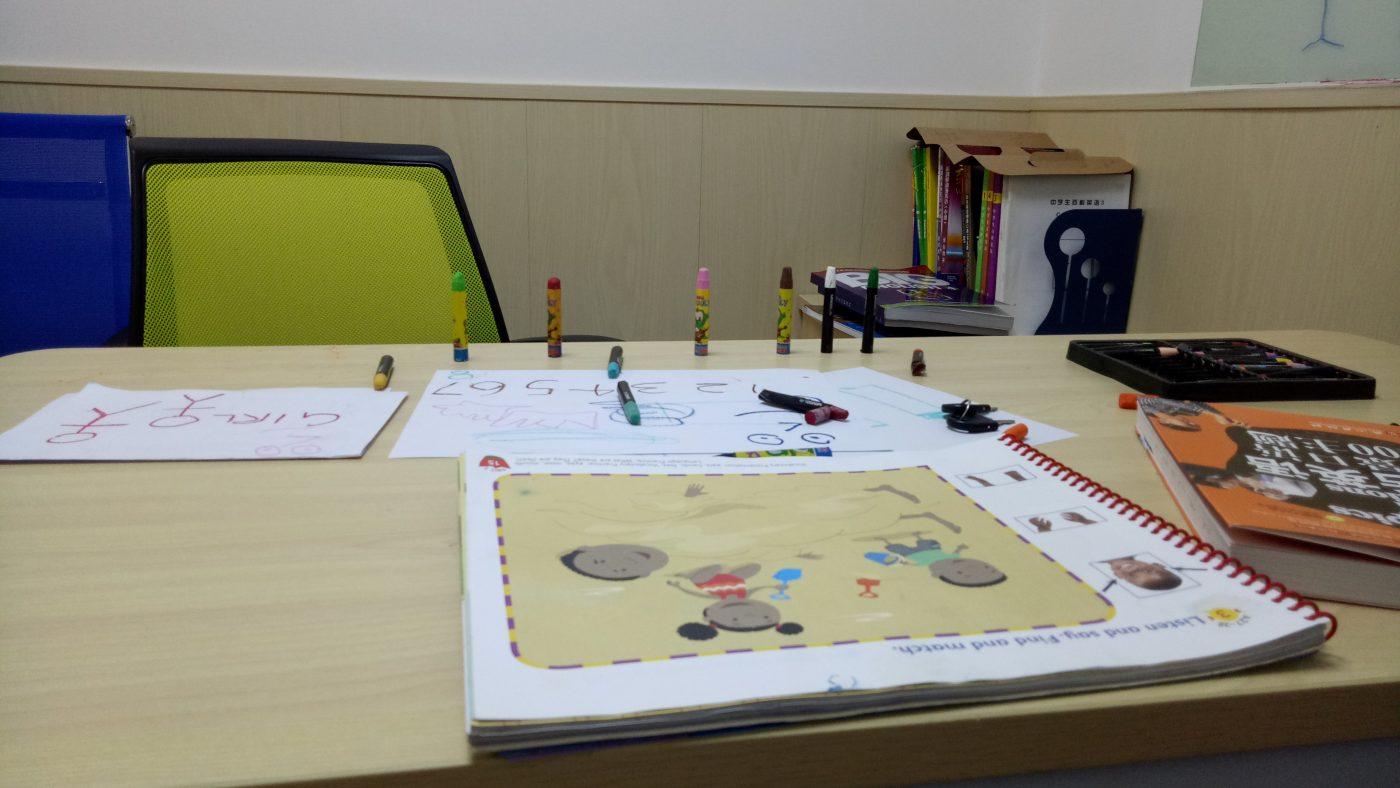Teaching One-On-One IELTS English In China – Basketball Student
In China, Guangzhou, working as an Australian English teacher, on May 30, 2018, I prepared for my teaching job, to teach English as a second language (ESL) in World International English located in Tiyixi Lu (体育西路).
The time was 5:40 pm when I finished my coffee in Rock Mall’s (乐蜂广场)Costa Coffee. I was learning to adjust back into my routine one-hour metro ride from Shayuan (沙园) to the World International English office in Tiyuxilu.
The metro it was so packed with people! There were no hiccups in terms of time on the metro ride.
in Tiyuxilu (体育西路) I walked through the pouring rain towards work, playfully screaming, “耶!托马斯!” That was an ode to Thomas The Tank Engine spoken in Chinese.
Cooling Down From Guangzhou Humidity
Once inside World International English I was already sweating. Guangzhou humidity is a killer.
I ducked into the bathroom to take my shirt off. The American English teacher was there. We chatted about how hot it is.
I stayed in the bathroom washing my face and cooling down for a few minutes.
I tried to put my button-up shirt on, but a lot of sweat soaked through my shirt. Rather than be bothered, I grabbed a handful of tissues with me.
Then I stood under an icy air conditioner in the hall.
Finally, I went into the English teaching academy. I became seated on one of the office chairs and prepared for my English class at 7 pm.
Looking For A Classroom To Teach English
The classroom I was supposed to teach English language in was taken by a colleague on a phone call. I could see my Chinese student also walking around, confused with the mix-up.
I hopped up, came outside of the office area, and greeted the male Chinese student. The Chinese student was really tall, basketball-player tall. I asked him to bear with me for a minute.
I turned back to my student assistant colleague, to say, “I think my English language classroom is taken.”
She jumped up quietly, and looked for another classroom.
My student assistant returned, “You can go into C1.”
The Chinese student followed me, but another classroom was learning English.
The whole time, my student was standing, learning to be patient.
We passed C2, and ended up entering classroom C3.
I thanked my colleague for her help. She nodded her head at me.
One-On-One English Class With Chinese Student
The English language class happened to become a one-on-one class with the lone male Chinese student.
I turned the air conditioner on, trying simultaneously to fix the air conditioner.
I asked, “Hello, do you need air conditioning?”
When he responded in a slow, muddled voice, I could see his English speaking was not that good.
Russian Greetings In English Class
In I then asked him, “How are you today? How long has it been since you studied English?”
He replied, “It has been a year. I learnt Russian. I have not studied English for a long time. I forgot how to speak English.”
I then began to speak in Russian to him.
The Chinese student was fairly ho-hum until that point.
His eyes popped open, thinking, “I can speak in Russian to this guy!”
I soon saw he had life.
As an English teacher, that moment was quite funny.
We exchanged stories for a few minutes, as I did my best to position the air conditioner in a room that was absolutely stifling from all the trapped summer moisturizer after the heavy downpour outside.
I guess I just had to cope.
English Class Conversational Dialogue
Then the official English language class began.
I said, “Since it is me and you, you can ask me any English questions specifically. We can begin by reading the situational conversation. Since there is no one else here, you can read the whole passage. If you make any errors with your pronunciation, I will write them down on the board.”
While the Chinese student read from the conversational dialogue, I wrote down 9 different words in English he pronounced incorrectly.
- Great
- Assume
- Smashed
- Puree
- Fasten
- Delivery Driver
- Takeaway
- Prescription
- Expired
When he finished the English language conversational dialogue, I pointed to him and asked him to pronounce the words in English.
Learning English Word Pronunciation
The Chinese student’s word pronunciation was really terrible.
For example, he incorrectly said the English word “great”. I had to teach him a new vocabulary of similar English words, “crate, great, ate.”
I got him to pronounce those three words in English repeatedly to drill the English pronunciation into his mind.
For the English word “expired”, he used pronunciation similar to the English word “pear” to say “expired”. His articulation in English obviously needed to improve.
I had to teach the student to use the “eye” pronunciation for “expired” rather than the “pear” pronunciation he was accustomed to when speaking English.
I instructed the student, “You need to go home and practice pronouncing these words by yourself, and improve, because a native English speaker won’t be able to understand your meaning. They have to think about it.”
English Teaching Activity – Buying Groceries
Then we had an English language learning activity. The English language learning activity asked the student to discuss different foods he has eaten.
Some sample questions from the English lesson handout.
- “Have you purchased food from a restaurant?”
- “Where do you shop for groceries?”
- “What do you buy?”
As an English teacher I used this dialogue to kick-off the spoken English IELTS activity.
As soon as I asked him whether he has shopped in a supermarket, I was surprised with his answer.
Speaking English, he said, “I never buy food from a supermarket.”
I asked, “Really? Where do you buy your food from?”
Speaking Chinese, he answered, “Taobao (淘宝).”
I asked, “You buy all your supermarket groceries from Taobao?”
He answered, “Yes.”
“How do you buy it? How frequently do you buy it?”
Speaking English, I asked the Chinese student to give more detailed descriptions of his process.
Defining New English Words In Chinese
Every now and then I used English vocabulary that he did not understand. I would provide an English language definition but the Chinese student still did not understand.
The word “delivery driver” was one of these problem words in the English vocabulary.
In cases where I, as an English teacher, had exhausted all possible English teaching methods, one of the teaching strategies I adopted was to use Chinese to provide word definitions.
Speaking Chinese, I explained, “快递人叫… delivery driver.”
As the English class discussion progressed, I provided word definitions in Chinese for the English words, “takeaway”, “prescription”, and “expired” to help the struggling Chinese student better understand the English vocabulary word.
The student asked, “What does expired mean?”
I said, “过期. If you buy something and the date is passed, that means it is expired. You can also say this class, when 8 pm comes, then that means our class time has expired.”
IELTS Questions To Practice Spoken English
I could see the Chinese student was not challenged merely by answering English language questions. I wanted to challenge him with an IELTS question to help him better learn English, so I maneuvered to use Chinese to ask the student a new question that he had to provide a complex answer for.
I asked, “What is the difference between takeout (外卖) and takeaway (打包)?”
Speaking English, he responded, “Takeout (外卖) is food you buy on the internet that you want to eat. The restaurant will deliver it straight from the restaurant, to you. Takeaway (打包) you have to go into the restaurant. You don’t want to eat in the restaurant, so you take the food away (打包) from the restaurant.”
Teaching English Grammar In China – Simple Past Tense
Grammar was the next part of the English lesson language handout. The grammar lesson focused on simple past tense.
I taught the Chinese student the difference between “talk” and “talked” in English.
He said, “I have learnt this already.”
I challenged, “If you have learnt simple past tense already, then I can teach you something more complicated. I will teach you past perfect tense.”
Speaking English, I told him, “You need to learn not just the past and the present verb, but also the “在” word.
I wrote the character “在” on the whiteboard.
He then said, “Your Chinese characters are really good. You can write Chinese characters well.”
I digressed, “I write it down on the board because I don’t want to forget. I am forgetting all my Chinese. This is a good way for me to continue to remember Chinese.”
I carried on teaching the past, present, and future tenses in English language grammar to the Chinese student.
Discussing WeChat (微信)and Taobao (淘宝)Ecommerce Shops In China
Since we often mentioned Taobao, I also asked him a series of Taobao-related questions.
- “Do you have a Taobao store?”
- “How do you create a Taobao store?”
- “What identification do you need to register a Taobao store?”
- “Do your Chinese friends have a Taobao store?”
- “Do you sell Taobao products on WeChat?”
The Chinese student replied in English to my English questions, “I advertise online.”
I asked, “Do you have to pay money to advertise online?”
The student replied, “No. Every day I advertise on WeChat.”
I asked, “Who do you advertise to? How do you get your customers?”
Speaking English, he replied, “The friends I have on my WeChat circle is who I advertise products to.”
That is his Taobao business model. That is what everyone else in China does.
I wondered, “Do you have many friends that do the same thing?”
He replied, “Yes. Every single Chinese person I know will sell something on WeChat.”
How Does A Foreigner Set Up A Taobao Shop (淘宝)?
Then, for my own business’s sake, I asked the student, “How do I register for Taobao? Do I need a Chinese ID?”
He replied in English, “For Taobao, you need a Chinese bank account linked to your mobile phone and email. Then you can sell products.”
In my mind, I knew creating a Taobao ecommerce store is difficult for foreigners to achieve, because foreigners – or Westerners overseas – largely do not possess a Chinese bank account.
Teaching English Verbs Using Past Tense And Present Tense
Then, I brought our attention back to educate the Chinese student on English past tense and present tense verbs.
In English, I asked, “For the word ‘sell’, give me one sentence for each past, present and current tense?”
He answered, “I sold Taobao products yesterday.”
I rewarded, “That is correct.”
Speaking English, the student continued, “I selling Taobao products.”
I stamped, “No. That is not correct. You should say ‘I sell Taobao products online’. To sell is an action you are doing right now (正在). Selling is 在买.”
I explained, “You could say, ‘I sell Taobao products. I am selling Taobao products today.’ That is the difference. One is the verb, and one is the current verb.”
English Class Concludes
Our English language class time had expired. We had run out of time.
I told the Chinese student, “We only have a couple of minutes left. Maybe you can answer the grammar exercises. I can mark your homework. Then I have to get ready for my next class.”
It took the Chinese student only one minute to write the past tense grammar for all questions in the English grammar exercise.
I checked it was all correct.
Then, in English, I said, “Thanks for coming into the class. I am sorry I was late to the class. We had a bit of a mess-up with the rooms.”
He said, “That is fine.”
I was happy with the English speaking component of the hour-long one-one-one English lesson. The Chinese student was able to learn English
Are you looking for suitable language exchange partners in China and abroad?


Diary Of A Mad Chaos is a daily diary written from March 1996 until today, of which individual books and book series have been created, namely “The Lost Years” an exploration of young, entwined love, the “Wubao In China (猎艳奇缘)” book series which provides an extensive comparative analysis of the cultural differences between Eastern and Western societies, and the book titled “Foreigner (华人)” an exploration of race relations in Australia.










